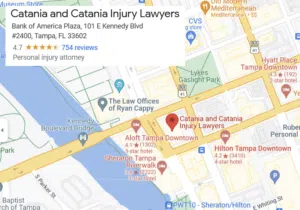
The answer to this question depends on the type of personal injury case. If your personal injury case arises from an auto accident, it should settle within a matter of months. If your personal injury case arises from another type of accident, such as a slip-and-fall accident, the timeline for settling could be much longer.
Insurance companies handle the various types of insurance claims in different ways. But the common thread in all insurance claims is that the claims adjuster will probably use all the time allowed to investigate the claim.
Here are the things that are important to know about the time that an insurer will take to settle a personal injury case.
Table of Contents
Types of Insurance

As of June 2021, Florida insurers offer two types of insurance — no-fault auto insurance and liability insurance for other accidents. Settling an injury case under the personal injury protection (PIP) coverage of your no-fault auto insurance policy can happen quickly because the insurer does not need to investigate fault.
With liability insurance, however, the insurer needs to investigate fault. As a result, an insurer could take significantly longer to settle an injury case for accidents that do not involve auto insurance.
No-Fault Auto Insurance
Florida currently has a no-fault auto insurance system. But if Florida’s Senate Bill 54 (SB54) becomes law, Florida will scrap its no-fault system and shift to an at-fault system. This change could significantly alter the timeline for settling a car accident injury case.
Under no-fault insurance, you file a claim with your own auto insurer after an accident. Your insurer pays benefits to you without regard to fault.
As a result, your insurer only needs to investigate:
- The severity of your injuries
- Cause of your injuries
- Reasonableness of medical treatment
Your insurer must pay PIP benefits if it determines you incurred reasonable medical expenses for injuries caused by an auto accident. The insurer can complete the investigation from a review of your medical records. As a result, Florida law sets an aggressive timeline for the insurance company to settle your claim.
No-Fault Settlement Timelines
Under Florida law, the insurer must acknowledge your initial claim and send you proof-of-loss forms within a reasonable time after you report your accident. Florida law does not specify the length of time. But in other fields of insurance, the insurer has 10 to 14 days to acknowledge the claim and send the proof-of-loss forms.
Once you supply the proof-of-loss forms and medical records, the insurer has 30 days to decide whether to pay the claim or deny coverage. The insurer will violate Florida law if it fails to investigate the claim or arbitrarily denies the claim. The insurer must make a good faith effort to pay it if the claim falls within the insurance policy.
If the insurer decides to pay the claim, it has 20 days to pay you. So in a best-case scenario, an insurer should put a check into your hands within 64 days after you report your accident.
Delays in No-Fault Settlements
No-fault insurance claims do not always go smoothly.
The insurer can take longer than 64 days to pay your claim for a variety of reasons, including:
- Insufficient documentation
- Questions about causation
- Pre-existing injury
- Suspicions of faked or exaggerated injury
The 30-day timeline still applies to the insurer’s decision to accept or deny the claim. But in cases in which the insurer has questions, the insurer will simply deny the claim and ask for more documentation. Alternatively, the insurer can deny the claim and tell you that it needs to conduct additional investigation. In either case, your settlement will take longer than 64 days.
Liability Insurance
Liability insurance is the other major form of insurance that you will encounter in a personal injury claim. For example, a homeowner’s liability policy usually covers slip-and-fall accidents and dog bites.
Similarly, a business’s liability policy will cover accidents caused by the business’s activities. Thus, if you suffer a construction accident when something falls from a scaffold, you would file a claim against the construction company’s liability insurer.
Another form of liability insurance is malpractice insurance. If your doctor commits an error and you file a claim for medical malpractice, the insurer must determine liability for the injury.
Liability Settlement Timelines
The same timelines apply to liability claims. Since the insurer must determine liability for the damages, these claims almost always take longer to settle. In many cases, the insurer will inform you during the initial 30 days that it needs additional time to investigate the claim.
This investigation could take a long time. As long as the insurance company moves with reasonable diligence and investigates in good faith, the insurer can take as long as it needs.
But as a practical matter, you will eventually receive a claim decision. If you disagree with the claim decision, you will need to negotiate with the insurer or file a lawsuit against the at-fault party.
Negotiating a Settlement
Another factor in the time to settle a claim is the negotiating time. After an insurer agrees to pay a claim, it will make an offer. The offer will probably seem low. This is a negotiating tactic that insurers use to get you to settle for less than the full value of your case.
Patience and a good negotiating strategy can keep the negotiations moving. But ultimately, you might need to hire an experienced personal injury lawyer to keep the pressure on the claim adjuster and get a fair settlement offer.
Litigating a Claim
Another process that will slow down your time to settle a claim is filing a lawsuit. A lawsuit can pressure the insurer to settle your claim. No insurer wants to pay lawyers to fight a lawsuit if it knows it can settle the claim.
On the other hand, lawsuits can take a long time. If the lawsuit goes to trial, a year or more could pass before you finally get a verdict and a damage award.
The Role of the Lawyer
A lawyer can help keep the insurance claim process moving forward. Insurers usually avoid playing games when a lawyer is involved because they want to avoid a bad faith insurance lawsuit. Moreover, a lawyer knows how to document a claim. This allows the insurer to act on the claim without asking for additional information.
To learn more about your personal injury case, please contact our law office in Tampa online or call us at (813) 222-8656. Our legal team at Catania & Catania injury lawyers are ready to answer all of your questions.




